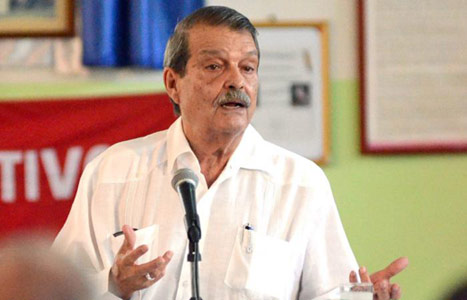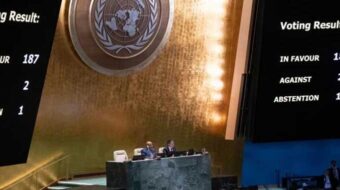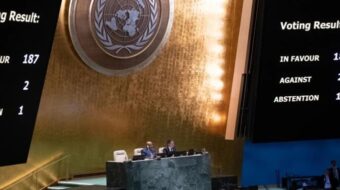
Every year in September, the Cuban Foreign ministry releases a report on the U.S. anti- Cuban blockade directed to member states of the United Nations. Available here.
The purpose is to persuade General Assembly delegates to vote “yes” on a Cuban resolution entitled: “Necessity of ending the economic, commercial and financial blockade imposed by the United States of America against Cuba.”
Deputy Foreign Minister Abelardo Moreno released this year’s report at a press conference on September 10. The vote takes place within a few weeks. Large majorities have voted every year for 22 years to end the blockade, in recent years overwhelmingly so. Last year 188 nations favored the resolution, two were against (The United States and Israel), and three abstained.
The report’s authors invoke considerations of international law, justice, morality, and human decency to bolster their argument. Most of the 35-page report consists of a detailed cataloguing of specific adverse effects cropping up during the past year. They are categorized under the headings of health care, education, provision of food, sports, and culture.
Although these examples result from only one year of blockade, they fill page after page of the report. That a similarly long list could have been devised every year for 55 years of the blockade is daunting. An accounting of the entire half-century experience would fill volumes.
Foreign trade and investments
One large section on the “foreign sector” deals with “foreign trade and investments,” reactions by foreign banks and lenders to U.S. pressure, and stealing of patents and trademarks. In fact, since 2009 the U.S. government “has forced 36 U.S. and international entities to pay almost 2.6 billion dollars” in fines for dealing with Cuba. As a result, “Cuba’s access to international loans is still diminished and many banks are refusing to handle dollars on Cuba’s behalf. [And] harassment of banking-financial activity [means that] normal progress in all spheres of economic, social, cultural and political life continues to be seriously blocked.”
Another major section focuses on U.S. violations of international law, especially those involving individuals, organizations, and agencies of third countries. These are the so-called “extra-territorial” effects of the blockade. U. S. policies impinge on travel, educational, and financial projects Cubans share with other countries. They damage Cuba’s partnership relationships in pursuing humanitarian or cultural activities. Problems with international banking and loan availability are by far the most serious extra-territorial manifestation of the blockade.
The document concludes with a listing of individuals and organizations throughout the world who weighed in against the blockade during the past year. The listing of those in the United States exceeds that of past years.
The strength of the Report is most evident in its introductory section, which is noteworthy for clarity, the perspective it provides, and even eloquence. It communicates a multifaceted argument calculated to reach member states of the United Nations and peoples of the world. A few quotes make this point:
“The period being dealt with by this report was marked by a toughening of the genocidal blockade policy.”
“To bring about ‘hunger, desperation and overthrow of [the Cuban] Government’ continues to be the declared purpose of the United States Government.” (The citation is from a memo State Department official Lester D. Mallory wrote to a counterpart in 1960.)
“The blockade qualifies as an act of genocide by virtue of the Convention on the Prevention and Punishment of the Crime of Genocide of 1948 and as an act of economic warfare according to the declaration regarding the laws of naval war adopted by the Naval Conference of London of 1909.
“The blockade inflicts important adverse effects on the material, psychological and spiritual wellbeing of the Cuban people and it imposes serious obstacles on its economic, cultural and social development.”
The United States wants to “isolate a small country because it defends its sovereignty and its right to freely choose its future.”
“The economic damage caused on the Cuban people … considering the depreciation of the dollar … totals 1,112,534,000,000 dollars.”
The segment recounting adverse blockade effects on health care is striking. Cuba has “the need of acquiring medicines, reagents, spare parts for diagnostic and treatment equipment, instruments and other supplies in distant markets, making it necessary to often resort to intermediaries in distant markets and thereby unnecessarily increasing costs for the sector.” Extra healthcare costs for one year amounted to $66.5 million.
Implications for Cuba solidarity
Presentation of the report has serious implications for Cuba solidarity activists in the United States. The report does not cover blockade mechanisms leading to shortages. The implication is that Cuba cannot change them, that the U.S. government can, and that the responsibility for changing dreadful policies lies with its own citizens.
For example, many items Cuba needs are available in third countries. But in a world of multinational corporations, a small component of an item, or some of its financing, may have derived from the United States. And according to the “Cuba Democracy Act” of 1992, still in effect, the item is thus off limits. The Report, in effect, is saying that it’s up to justice-seeking, political opposition forces in the United States to fix such things.

MOST POPULAR TODAY

High Court essentially bans demonstrations, freedom of assembly in Deep South

U.S. imperialism’s ‘ironclad’ support for Israel increases fascist danger at home

UN warns that Israel is still blocking humanitarian aid to Gaza

Resource wars rage in eastern Congo, but U.S. capitalism only sees investment opportunity







Comments